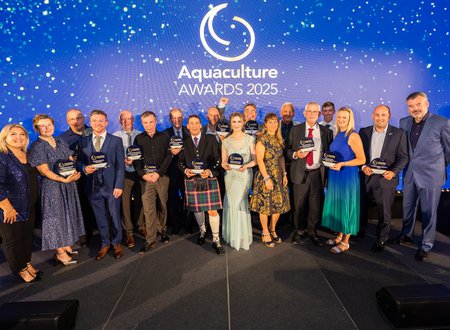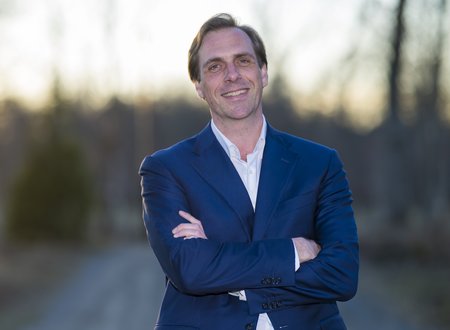Ecuador's shrimp industry sets new social responsibility benchmark with living wage project
The Sustainable Shrimp Partnership, in collaboration with IDH, has launched a project in Ecuador to measure and validate that workers on SSP shrimp farms receive a living wage.
Aquaculture Award 2025 winners announced
The winners of this year’s Aquaculture Awards were announced at a celebratory dinner in Inverness attended by leading figures from across the sector.
Broodstock Capital invests in Norwegian hatchery producer
Broodstock Capital has acquired a major stake in Neptun Salmo, a Norwegian hatchery producer located in Nord-Trøndelag.
Skretting highlights social license, emission cuts and new sustainability vision in 2024 report
Skretting’s 2024 Impact Report highlights significant progress in sustainability, with CEO Bastiaan van Tilburg emphasizing the importance of transparency, collaboration, and the company’s new ACT value proposition to drive industry-wide change.
Therese Log Bergjord joins Aquaticode as strategic advisor
AI phenotyping company, Aquaticode, the AI phenotyping company, appointed Therese Log Bergjord as strategic advisor.
INVE Aquaculture opens warehouse in Ecuador
The new facility, located in Santa Elena, improves logistics and reinforces its role as a reliable partner for hatcheries and producers.
WorldFish project to facilitate Kenyan farmers' access to improved tilapia strains
The project is anchored around the introduction and greater access for farmers to improved strains of tilapia, Genetically Improved Farmed Tilapia (GIFT).
BIO-UV Group celebrates 25th anniversary
France-headquartered BIO-UV Group operates in over 70 countries and employs more than 160 people.
Project to decode salmon’s light needs
Researchers are currently mapping out how light is used in the industry in Norway through a survey.
Tech trials to improve efficiency in shrimp RAS farming
Three-Sixty Aquaculture is collaborating with NanobOx and GIS Gas Infusion Systems to conduct nanobubble and CO₂ stripping trials at its shrimp RAS facilities.
Water treatment company appoints managing director for Iceland market
Magnus Thor Asgeirsson will lead the growth of NP Innovation in the Icelandic market.

Aquaculture Award 2025 winners announced
WA25 Uganda conference program revealed
Dean Akiyama to receive Lifetime Achievement Award at Shrimp Summit
Action, excellence and legacy celebrated at the 57th FEAP Annual General Meeting

Skretting highlights social license, emission cuts and new sustainability vision in 2024 report
Salmon short operculum linked to initial feeding and operational routines
Alltech shares global feed production survey data
Cargill’s aqua nutrition business marks 16 years of sustainability reporting
Innovations in Hatchery Feeds
Aquaculture hatcheries traditionally rely on rotifer and Artemia as live feeds for the early larval stages. But technology is evolving and has allowed the industrial production of other live feed species and smaller dry feeds.
Hatchery Feed & Management hosted this webinar to discuss some of these recent innovations, with two of the recent disruptors in live feeds, CFEED and Planktonic, and inert feeds with BioMar.
Sponsored by CFEED and Planktonic.
Moderator: George Koumoundouros, Professor of Marine Biology, University of Crete
Vitapro launches new diet for shrimp broodstock
Nicovita introduces innovation to enhance the early stage of shrimp farming
INICIO N is built on four key pillars: high-quality larvae, an advanced initial feed portfolio, specialized technical advisory services, and precision-feeding technology.
Japanese company unveils land-based aquaculture system
The systems has the potential to efficiently farm large amounts of fish even for those with no aquaculture experience.
Skretting, Zooca introduce copepod feed for marine juveniles
Fish and shrimp hatcheries now have access to fresh, canned Calanus finmarchicus.
New IP camera purpose-built for AI applications in aquaculture
ReelData released a camera developed from the ground up for AI applications in aquaculture.

